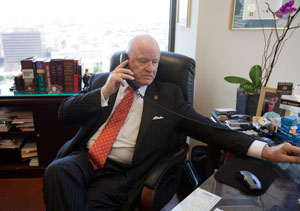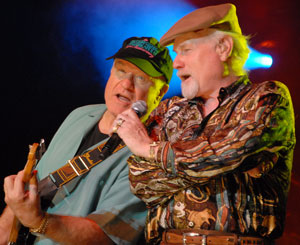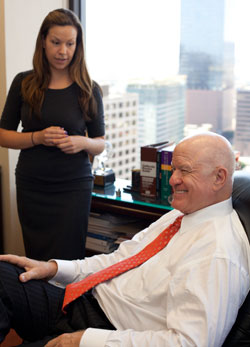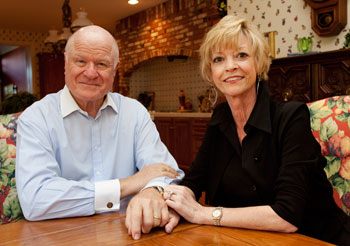Pat Kelly harmonizes his musical past
with a career in
the law
By Susan McRae
Special to the Bar Journal
Patrick M. Kelly won’t officially take over as 88th
president of the State Bar of California until Oct. 13, but the veteran trial
lawyer and western regional manager of 850-lawyer Wilson Elser Moskowitz
Edelman & Dicker is already preparing for the job ahead.
 |
Pat Kelly in his L.A. office.
Photo by Stephanie Diani
|
On a recent day, while seeming to segue effortlessly between
a whirlwind of phone calls, conferences and an assortment of management tasks, he
made time to join the presiding judge and others officiating at an enrobing
ceremony at the downtown Los Angeles County courthouse.
A professional musician before turning to the law ― he
has played guitar with the Beach Boys and other surfer music groups ― Kelly
addressed the new judges using an analogy to his former career.
“When you write a song, you have to have a concept and then
you have to figure out how the words and melody fit together and then you have
to add orchestration, background, vocals and whatever lead position is going to
be taken. It’s a very complex process.” he told the seven inductees, “and if
you miss any step, the thing falls flat.
“Judges have to do the same thing with every decision they
make. The only difference is a judge has to do it dozens of times a day.”
Then, he went on to say ― to vigorous applause ―
that when he’s inducted as president later this month at the State Bar’s annual
meeting in Monterey, he’ll do “everything the bar can do to aid in the cause”
of restoring full funding to the state courts.
Over the past three years, the courts have seen $650 million
in cuts with another projected $540 million to come, causing massive staff
layoffs, courtroom closures and cuts in vital services. The crisis not only affects
public access to justice, he says, but lawyers, especially plaintiffs’ lawyers,
face years of delays in getting to trial. He called the situation the worst he’s
seen in his four decades of practice, adding that the problem isn’t limited to
California. It’s nationwide.
 |
Pat Kelly and Mike Love of the Beach Boys
jamming together in 2006.
Photo courtesy of Professional Liability Underwriting Society
|
Fit and energetic, Kelly, 69, seems to be everywhere at once
without appearing rushed. Friends and colleagues say those traits and his
longtime involvement in bar, professional and community activities make him the
ideal person to head the state’s 238,000-lawyer organization at a time when the
economic crisis threatens to dismantle the justice system.
The president of the Los Angeles County Bar Association in
1990-91, Kelly also served from 1995˗2002
on the Commission on Judicial Performance ― the disciplinary body for
judges that closely parallels the State Bar’s disciplinary arm for lawyers ―
and helped draft new rules that remain in place today. From 2002˗04, he was president
of Los Angeles County Dispute Resolution Services. He’s a fellow of the
International Academy of Trial lawyers, a pre-eminent, invitation-only group
limited to 500 trial lawyers from the United States. He also served on Wilson Elser’s
firmwide executive committee from 1981, a year after he started at the firm,
until stepping down last year.
Terming Kelly a “natural leader,” Sheldon Sloan, a close
friend and past Los Angeles County Bar president, said, “You know that saying,
‘If you want a job done, give it to a busy man?’ Pat Kelly is a busy man who
gets the job done. He starts and finishes it. You don’t have to call back
later. He gets it done.”
Kelly’s tenure as bar leader also comes as changes to the
Board of Trustees are phased in. Restructured last year by the Legislature, the
new board will consist of four fewer lawyer members by 2014, with the majority being
appointed by the state Supreme Court and the Legislature, rather than elected
by attorneys. Board members’ titles have also been changed from governors to
trustees, to better reflect the bar’s renewed emphasis on protecting the trust
the public invests in lawyers.
The change is more an attitude shift, Kelly says, ultimately
accomplishing the goal of public protection by complementing the discipline
system with assuring that lawyers become more professional through “education
and thought leadership.” Although initially opposed to lawyer members being appointed
rather than elected by peers, he says his attitude has changed, too, and he’s
got a good group of board members who are in agreement on how to proceed.
 |
Pat Kelly with his daughter Laura Kelly
Photo by Stephanie Diani
|
Dovetailing with board changes is talk of more stringent
discipline guidelines, which Kelly supports. The state Supreme Court, which
signs off on the State Bar Court’s attorney discipline recommendations, recently
returned 42 cases for reconsideration and bar leaders support using it as an
opportunity to refocus on the discipline standards. Other priorities on Kelly’s
list for the year ahead include ensuring access to legal services, helping new
and senior lawyers ― who can’t find work or are transitioning from large
firms, respectively ― by putting them in touch with pro bono
opportunities, and refocusing lawyers’ mission as problem solvers, he says, rather
than “going straight to gladiator role.”
Born in Pasadena, Kelly and his two siblings grew up in
nearby, rural Glendora in a time before freeways. They lived on a 15-acre
property that also housed a rest home, part of a family business run by his
mother. His father was an aerospace engineer and part-time golf teaching pro. At
age 12, Kelly started playing guitar, a hobby that would quickly consume his young
life.
While attending what was then Pomona Catholic High School,
he managed to juggle classes with being football team captain, student
government officer and playing music with local groups. By the time he entered
Pomona College in 1962, studies and school activities had taken a decidedly back seat.
He began performing with well-known rock and surf groups. Eventually, under
pressure from his family “to get a real job,” he agreed to give law school a
try. A school adviser knew the dean of Loyola Law School, and Kelly enrolled.
He says he believed that he’d flunk out in six months and return to music. But he
didn’t flunk, and for the next 18 years he says he didn’t pick up a guitar
except to play at a friend’s birthday or a singalong.
In 1966 as the Vietnam War escalated, he says
he tried to enlist in the military but was disqualified because of a stomach ulcer,
a souvenir he attributes to his rowdy days in rock and roll. He joined the
Southern Pacific Railroad handling its litigation and went from there to
several mid- to large-size firms, ending at Jones Day in 1980. That’s when
Wilson Elser, a full-service firm that focuses on litigation with strong ties
to the insurance industry, recruited him to manage its Los Angeles office. The
job ultimately led to western region managing partner over offices in Los
Angeles, San Francisco, San Diego and Las Vegas.
During that time, he grew the Los Angeles office from four
to more than 50 lawyers today, including daughter Laura Kelly, who joined out
of law school in 2008 and, like her dad, is active in the Association of Ski
Defense Attorneys. His namesake son, a pediatric psychiatrist, is director of
child and adolescent psychiatry at Johns Hopkins Hospital.
Then there’s the music. A chance meeting in the early 1980s
with singer/songwriter Bruce Johnston, who joined the Beach Boys several years after
Kelly stopped performing, brought his life full circle. Johnston says he
remembers being invited to Kelly’s house for the first time. He says Kelly took
him aside, saying he wanted to show him his closet.
“Here’s this five-day-a-week guy in a coat and tie, a young
gun coming up through the ranks,” Johnston says. “I thought, ‘Well, OK, maybe
he wants to show off a new tuxedo,’ and here are all these guitars … worth
enough to buy a condo.”
 |
Pat Kelly and his wife Gail Gibson Kelly at home.
Photo by Stephanie Diani
|
Kelly’s moved houses since, and the instruments are now tucked
into built-in shelves in a walk-in closet in the guest room of the home he
shares with wife Gail Gibson Kelly, an executive guidance counselor for a management
consulting firm. His vintage collection has been his life’s one constant, he
says. It includes several Fender Stratocasters, a Les Paul Goldtop, a Chet
Atkins County Gentleman 6120 and a Martin D 35. Plugging in a Paul Reed Smith,
custom made with inlaid turquoise and silver, he strums a few chords.
Since the serendipitous meeting with Johnston, who’s become
a close friend, Kelly has performed with the Beach Boys on occasion and,
friends say, doesn’t miss a chance to demonstrate his musical talents. Case in
point was the 1991 wedding of Los Angeles County Superior Court Presiding Judge
Lee Smalley Edmon to Richard Burdge, this year’s Los Angeles County Bar Association
president. During the reception, Kelly borrowed a band member’s guitar and
played “Wipe Out,” the 1963 Surfaris’ classic. Edmon says she keeps a photo of
the occasion in her wedding album.
In Kelly’s roomy, corner law office, a stand holds a replica
Stratocaster signed by the Beach Boys, and a framed letter on the wall
expresses the group’s regrets at being unable to attend his 1990 induction as
Los Angeles County Bar Association president because they were on tour in Montreal.
For nearly two decades since, Kelly says he’s tried to
persuade his firm’s management to let him run for State Bar Board of Trustees.
But he says founding partner Thomas Wilson asked him to defer, knowing it would
be a time-consuming commitment, especially if he ran for president. New firm
chairman Daniel J. McMahon, who took over after Wilson’s retirement, finally gave
Kelly the green light. In retrospect, Kelly says the wait was worth it because
the experience he’s gained will make him a better leader.
McMahon, who says he’s become well acquainted with Kelly’s
musical side during frequent performances at firm retreats, believes that
aspect of his personality exemplifies his success and ability to connect with people,
including juries, judges, clients and opposing counsel. “We couldn’t think of a
better example [to lead the State Bar] than Pat Kelly,” McMahon says. “He’s a
great role model for both the firm and the profession. He’s the type of person
you want in that role.”
As for Kelly, he says he believes what constitutes success
is to “do what you’re good at … and do the other as a hobby.” Though he loves
music, he says his highest ambition was to become a lawyer. But, he adds, “If you’re
lucky enough to include both, go with that. Many people don’t get that
opportunity. I was lucky.”
Susan McRae is a freelance writer based in Los Angeles
who has covered the California legal community for 20 years.